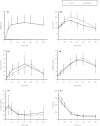Ingestion of an exogenous ketone monoester improves the glycemic response during oral glucose tolerance test in individuals with impaired glucose tolerance: A cross-over randomized trial
- PMID: 33010116
- PMCID: PMC8088997
- DOI: 10.1111/jdi.13423
Ingestion of an exogenous ketone monoester improves the glycemic response during oral glucose tolerance test in individuals with impaired glucose tolerance: A cross-over randomized trial
Abstract
Aims/introduction: As a low-carbohydrate diet and the use of sodium-glucose transporter-2 inhibitors are both known to increase D-beta-hydroxybutyrate levels, the effect of these levels on glucose metabolism has attracted attention. We investigated the acute effects of ketone monoester (KM) ingestion on blood glucose levels during the 75-g oral glucose tolerance test (OGTT) in participants with impaired glucose tolerance.
Materials and methods: Nine Japanese adults aged 48-62 years (4 men, 5 women) with impaired glucose tolerance participated in this study. After participants fasted overnight, we carried out OGTT for 180 min with and without KM ingestion on two separate days in a randomized cross-over design. We compared the area under the curve (AUC) of D-beta-hydroxybutyrate, glucose, insulin, C-peptide, glucagon and free fatty acids during OGTT.
Results: The AUC of D-beta-hydroxybutyrate during OGTT was significantly higher with KM than without KM (KM 5995.3 ± 1257.1 mmol/L·h; without KM 116.1 ± 33.9 mmol/L·h, P < 0.0001), and the AUC of glucose with KM was significantly lower than that without KM (KM 406.6 ± 70.6 mg/dL·h; without KM 483.2 ± 74.3 mg/dL·h, P < 0.0001). This improved glucose excursion was associated with enhanced AUC of insulin during the first half (0-90 min) of OGTT, even though the AUC of C-peptide during this period was unchanged. In contrast, the AUC of insulin, C-peptide, glucagon and free fatty acids during 180 min of OGTT were similar in both conditions.
Conclusion: The ingestion of KM decreased the AUC of glucose during 75-g OGTT in Japanese individuals with impaired glucose tolerance, and the mechanism might involve elevated levels of circulating early phase insulin.
Keywords: Impaired glucose tolerance; Insulin secretion; Ketone.
© 2020 The Authors. Journal of Diabetes Investigation published by Asian Association for the Study of Diabetes (AASD) and John Wiley & Sons Australia, Ltd.
Conflict of interest statement
The authors declare no conflict of interest.
Figures


Similar articles
-
Prior ingestion of exogenous ketone monoester attenuates the glycaemic response to an oral glucose tolerance test in healthy young individuals.J Physiol. 2018 Apr 15;596(8):1385-1395. doi: 10.1113/JP275709. Epub 2018 Mar 2. J Physiol. 2018. PMID: 29446830 Free PMC article. Clinical Trial.
-
A ketone monoester drink reduces the glycemic response to an oral glucose challenge in individuals with obesity: a randomized trial.Am J Clin Nutr. 2019 Dec 1;110(6):1491-1501. doi: 10.1093/ajcn/nqz232. Am J Clin Nutr. 2019. PMID: 31599919 Free PMC article. Clinical Trial.
-
Prior ingestion of a ketone monoester supplement reduces postprandial glycemic responses in young healthy-weight individuals.Appl Physiol Nutr Metab. 2021 Apr;46(4):309-317. doi: 10.1139/apnm-2020-0644. Epub 2020 Sep 17. Appl Physiol Nutr Metab. 2021. PMID: 32941737
-
Acute fructose administration decreases the glycemic response to an oral glucose tolerance test in normal adults.J Clin Endocrinol Metab. 2000 Dec;85(12):4515-9. doi: 10.1210/jcem.85.12.7053. J Clin Endocrinol Metab. 2000. PMID: 11134101 Clinical Trial.
-
Oral glucose tolerance test in diabetes, the old method revisited.World J Diabetes. 2021 Jun 15;12(6):786-793. doi: 10.4239/wjd.v12.i6.786. World J Diabetes. 2021. PMID: 34168728 Free PMC article. Review.
Cited by
-
Tolerability and Acceptability of an Exogenous Ketone Monoester and Ketone Monoester/Salt Formulation in Humans.Nutrients. 2023 Nov 22;15(23):4876. doi: 10.3390/nu15234876. Nutrients. 2023. PMID: 38068734 Free PMC article. Clinical Trial.
-
Exogenous ketone supplementation: an emerging tool for physiologists with potential as a metabolic therapy.Exp Physiol. 2023 Feb;108(2):177-187. doi: 10.1113/EP090430. Epub 2022 Dec 19. Exp Physiol. 2023. PMID: 36533967 Free PMC article. Review.
-
Effect of exogenous and endogenous ketones on respiratory exchange ratio and glucose metabolism in healthy subjects.Am J Physiol Cell Physiol. 2024 Apr 1;326(4):C1027-C1033. doi: 10.1152/ajpcell.00429.2023. Epub 2024 Feb 5. Am J Physiol Cell Physiol. 2024. PMID: 38314726 Free PMC article.
-
Diet and exercise are a fundamental part of comprehensive care for type 2 diabetes.J Diabetes Investig. 2023 Aug;14(8):936-939. doi: 10.1111/jdi.14043. Epub 2023 Jun 20. J Diabetes Investig. 2023. PMID: 37337794 Free PMC article. No abstract available.
-
A ketone monoester drink reduces postprandial blood glucose concentrations in adults with type 2 diabetes: a randomised controlled trial.Diabetologia. 2024 Jun;67(6):1107-1113. doi: 10.1007/s00125-024-06122-7. Epub 2024 Mar 14. Diabetologia. 2024. PMID: 38483543 Free PMC article. Clinical Trial.
References
-
- Balasse EO, Fery F. Ketone body production and disposal: effects of fasting, diabetes, and exercise. Diabetes Metab Rev 1989; 5: 247–270. - PubMed
-
- Schwingshackl L, Hoffmann G. Comparison of effects of long‐term low‐fat vs high‐fat diets on blood lipid levels in overweight or obese patients: a systematic review and meta‐analysis. J Acad Nutr Diet 2013; 113: 1640–1661. - PubMed
Publication types
MeSH terms
Substances
Grants and funding
LinkOut - more resources
Full Text Sources
Medical
Research Materials

